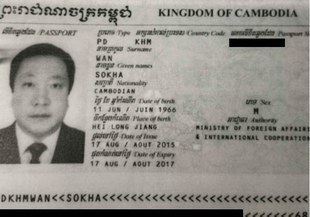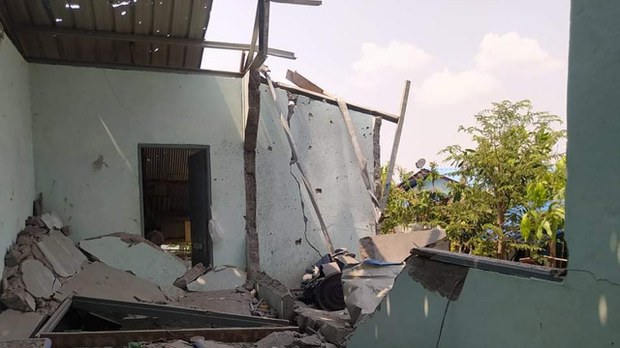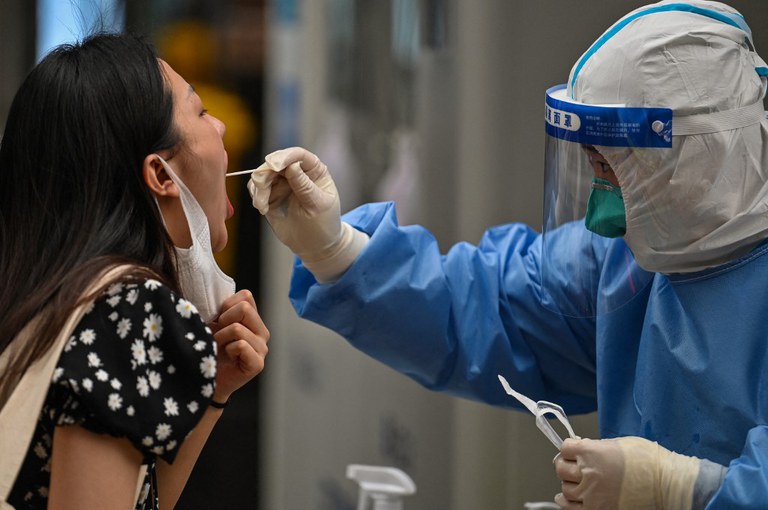
Warships arrive in Kyauk Phyu township as tensions rise in Myanmar’s Rakhine state
Myanmar’s military is sending more troops into Rakhine state amid fears that an informal ceasefire with the Arakan Army (AA) is about to collapse. A submarine arrived at Kyauk Phyu township on May 31, after sailing through the Bay of Bengal and traveling up the Than Zit river, according to locals. They said a warship arrived the following day. A resident, who declined to be named for safety reasons, told RFA’s Burmese Srrvice the ship was equipped with heavy artillery and helicopter landing pads. “The warship is huge,” the resident said. “It docked at Number Three Port in Kyauk Phyu and I saw soldiers disembark. I don’t know how many there were but I estimate that hundreds of soldiers were on board.” The two vessels moved to Number 15 Port at the Thit Pote Taung Naval Base in Kyauk Phyu after the troops disembarked. The township is home to one of China’s largest infrastructure projects in Myanmar, including the Kyauk Phyu Deep Sea Port. The resident speculated that the troop reinforcements were sent to protect China’s business interests amid fears of further clashes between the military and the AA. “There are a lot of Chinese projects here,” the local said. “The construction of deep-sea ports for docking submarines was also done by Chinese companies. So if the fighting intensifies I think the military is being deployed to protect China’s economic projects.” Some locals told RFA they were concerned about being able to get hold of basic supplies such as rice, cooking oil and salt as a result of the military reinforcement. When contacted by RFA, a junta spokesman denied that more troops had arrived on May 31. At a news conference on May 19 he said that the military could not be blamed if fighting breaks out in Rakhine state. Military tensions between the military council and the AA have been high since early May, with locals and Rakhine politicians concerned that fighting will soon intensify. An NGO which is monitoring the crisis released a report on Wednesday urging both sides to refrain from fighting. International Crisis Group (ICG) said people in Rakhine state would suffer if the war between the army and the AA breaks out again. Renewed clashes could impact 3 million Rakhine residents The AA began as a resistance group in 2009 and grew into a powerful ethnic army. It fought a two-year war with Myanmar’s military, which ended with an informal ceasefire in November 2020. The ceasefire has still not been formalized and the AA says it remains committed to establishing an independent state for ethnic Rakhines. Clashes between AA fighters and the military in two villages near Paletwa township on May 26 have raised fears the uneasy truce is about to crumble. The resumption of full-scale conflict between the military and the Arakan Army could put the lives of millions of ethnic minority residents of Rakhine State at risk, according to ICG. It said AA moves to gain territory in the north are likely to affect the lives of as many as 3 million ethnic Rakhines and Rohingyas. ICG senior adviser on Myanmar Tom Kean told RFA the humanitarian consequences would probably be worse than during the two-year war. Myanmar’s shadow National Unity Government (NUG) has invited the AA to join an alliance of regional armies to fight the military, which IGC said could also lead to an escalation in violence in Rakhine state.





